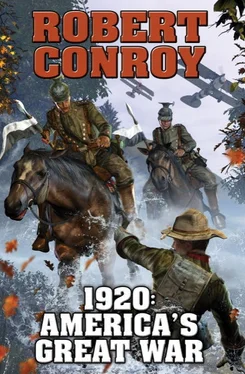Robert Conroy
1920
AMERICA’S GREAT WAR
Getting a novel published will never grow old. It was a dream come true from the first, and remains so today.
I can only thank everyone at Baen and Spectrum who had a hand in the development of 1920: America’s Great War.
Life is good.
* * *
To Quinn and Brennan: Ask your parents.
In the summer of 1914, Kaiser Wilhelm II’s Imperial German Army invaded Belgium and France. He planned a quick and brutal war that would result in a decisive victory over France and England; thus ensuring dominance in the world. At the end, national boundaries would be redrawn with provinces gained and lost as had been done in the past. Losing governments would fall and, after a few months of carnage, the world would go on.
Germany also found herself at war with Russia, but felt she could defeat France before dealing with a ponderous and slow-mobilizing Tsarist Russia.
It didn’t happen as planned and the horrors and convulsions of the next hundred years and more are directly attributable to the mistakes made by both sides in the summer and fall of 1914.
In the early weeks of what came to be called the Great War and later, World War I, France and Germany fought a titanic battle near Paris along the Marne River. Because of a combination of French luck and bravery, along with German mistakes and miscalculations, the French prevailed, Paris was saved, and the world was doomed.
The ironic and unintended consequences of the unexpected and somewhat undeserved French victory condemned the world to four years of horrific trench warfare which resulted in scores of millions dead and maimed.
The Germans lost the Battle of the Marne and it took four long and bloody years for Germany to be fully defeated.
The four years of World War I resulted in the destruction of empires. The collapse of Imperial Germany led tothe horrors of Hitler’s Germany and World War II. Russia fell to the communists and precipitated the equally horrific years of Stalin and the Cold War. The Ottoman Empire ruled from Istanbul disappeared, which ultimately led to the present chaos in the Moslem world. The disintegration of the Habsburg Austro-Hungarian Empire resulted in nationalistic violence in the Balkans.
But what if France hadn’t won at the Marne?
In this revised scenario, the Germans won the battle, took Paris, and drove the combined French and English armies south in a retreat that turned into a rout. This resulted in the taking of hundreds of thousands of French and British prisoners. Germany became the world’s one remaining Great Power. England and France were humbled.
The only remaining potential threat to the ambitions of Imperial Germany would have been the United States. America, under the stubbornly idealistic and unrealistically pacifist Woodrow Wilson, would discount any possible threat from the kaiser. As a man who had stated he would go to virtually any length to avoid fighting a war, Wilson likely would have allowed imperialistic Germany more expansionary latitude than any other president since Abraham Lincoln when he had been forced to ignore France’s invasion of Mexico during our Civil War. The toothless Monroe Doctrine would have been ignored.
Understanding both Wilson’s frail health and his devotion to peace at any price, Germany would have made preparations to eliminate the United States as a future threat. The United States already was an economic titan. Her population was far greater than Germany’s and was growing at an uncatchable rate. It is very likely that the kaiser would have wanted the U.S. eliminated as a power before she reached her full potential.
The Germans had contempt for the United States in general and Woodrow Wilson in particular. An aggressive and extremely ambitious Germany, led by the ultraimperialist Kaiser Wilhelm II, would have found it difficult to resist the temptation to eliminate the United States as a real or future threat.
* * *
This novel’s point of departure from real history is that late summer and early fall of 1914 during which the First Battle of the Marne was fought. Therefore, anything that happens after that is up for conjecture and subject to my vivid and sometimes warped imagination. In some cases, I’ve decided to have a little fun. For instance, I have the drive to make Prohibition an amendment to the Constitution defeated. There is some logic to this, as America’s bloody involvement in World War I was at least partial impetus for the silly law’s approval in the first place.
Similarly, the great flu epidemic of 1918 would not have occurred in the same time period since American troops weren’t training in cramped, unsanitary camps, and weren’t being sent to Europe at that time. I’ve chosen to have it occur in early 1921. Further, sources such as the New England Journal of Medicine now believe it originated in the USA and not in Europe or Asia as previous epidemics and plagues did.
If the idea of Woodrow Wilson, a victim of multiple strokes and virtually bedridden in 1920, running for a third term is implausible, think again. In his lucid moments he desperately wanted a third term to vindicate his legacy and try once more to have the U.S. join the League of Nations. He would not step aside, which, in the real history of 1920 sent the Democratic Party into a state of disarray. What helped him, of course, was that his wife kept the seriousness of his condition from the rest of the world.
Strange though this position may seem, when the Democratic convention opened that summer of 1920, New York bookies had Wilson as an odds-on favorite to be the Democratic nominee.
Many historians consider World War I to have been the most significant event in the last hundred years and the Battle of the Marne the most important single incident in the war. The tragedies of the last century can all be traced to the Fall of 1914.
In my novel, the world following 1914 would have been very different. But would it have been better?
–Robert Conroy
 PROLOGUE
PROLOGUE 
How could this have come to pass? Reggie Carville wondered. He was a captain in the British Army and was about to become a prisoner of the German Army and its demented leader, Kaiser Wilhelm II. Instead of victory, he and many tens of thousands of British soldiers would be guests of the Hun until they were repatriated back to England.
What a humiliation. What a terrible, horrible way to end this dismal year of 1914. He and thousands of others were squatting in the damp and clammy mud of southern France, waiting their turn to give up. It seemed so strange to be able to look across a field and see the German soldiers they’d been trying to kill just the day before standing in plain sight. He could almost hear their laughter and his humiliation ate at him. The British Expeditionary Force, the BEF, would soon cease to exist.
Of course , Carville thought, it was far worse for the French. At least the British force had remained intact. Not like the French Army; it had utterly disintegrated after its defeat on the Marne and the subsequent capture of Paris by the Germans.
And who could blame the poor French soldiers who’d finally thrown away their weapons and run like rabbits? Poorly led and poorly trained, they’d been directed to charge into the rain of bullets coming from the German machine guns. They’d been told that Elan , the spirit of the warrior, would carry the day. Machine guns would be as nothing in the face of Gallic courage. Instead, they died in bloody heaps, their bodies broken and the elan of the survivors evaporated. Hell, Carville thought, they were still wearing their traditional red and blue uniforms, which made such splendid targets. The British wore khaki and the Germans a field gray, both of which served as far better camouflage.
Читать дальше


 PROLOGUE
PROLOGUE 










